
Your guide to the latest developments in the international airfreight industry
FROM THE CAMEL TO THE APRON
ETIHAD AIRWAYS: CARGO NOW HAS A SEAT AT THE TABLE
MIDDLE EAST PLAYERS SCORE AT ACE 2023




Your guide to the latest developments in the international airfreight industry
ETIHAD AIRWAYS: CARGO NOW HAS A SEAT AT THE TABLE
MIDDLE EAST PLAYERS SCORE AT ACE 2023


One of the most historic and romantic images of the Middle East has to be the camel train. Camels are known as the ‘ships of the desert’ because their physical characteristics are well adapted to the conditions of the desert. Their large, flat feet are covered by protective pads which help in walking on hot desert sand. They are also blessed with double eyelashes, which protect them from sandstorms. Adapted to the harsh desert conditions of Central Asia and the Middle East, camels made ideal pack animals for travel along the Silk Road. These hardy creatures thrived on tough desert plants. They could carry more weight than horses or donkeys - as much as 136 kgs - and needed less water.
Now in the 21st century, the camel trains have long been relegated to the history books. Regional and international air freight traffic, including along the Silk Road, moves cargo in hours what once it took weeks to transport. Sand dunes have been replaced by airport aprons, AI, ground handling equipment and freight terminals.

Most Middle Eastern countries, 13 out of 18, are part of the Arab world. The most populous countries in the region are Egypt, Turkey, and Iran, while Saudi Arabia is the largest Middle Eastern country by area.
Other states include Bahrain, Iraq, Israel, Jordan, Kuwait, Lebanon, Oman, Palestine, Qatar, Syria, United Arab Emirates (Ajman, Abu Dhabi, Fujairah, Sharjah, Umm Al Quwain, Dubai, Ras al Khaimah) and Yemen. The history of the Middle East dates back to ancient times, with the geopolitical importance for freight transport in the region being recognised for millennia.
Nearly half a billion people live in the region. These include many of the world’s richest people living next to some of the poorest. The economy of the Middle East is very diverse, with national economies ranging from hydrocarbon-exporting countries to centralised economies and free-market economies. While the region is best known for oil production and export, which significantly impacts the entire region through the wealth it generates and through labour utilisation, change is in the air. Economies are moving towards alternatives to fossil fuels. With a growing middle class not dependent on oil, much demand for airfreight sees luxury and valuable consumer goods being moved to the region.
In terms of air cargo, the three main drivers for the region has been its role as a point of origin and destination for airfreight shipments while at the same time, it is one of the most important regions for transit shipments, including the 21st century replacement for the thousand year-old Silk Road between East and West.
India-based Mordor Intelligence, a research company that continuously tracks markets, has turned its eye on the region’s airfreight market. In a report that looks at freighter aircraft, market size and share analysis, growth trends and forecasts up to 2028, the company predicts the region’s freighter aircraft market is set to see a CAGR (Compound Annual Growth Rate) of over 4% during the forecast period.
The report states: “Cargo carriers from the Middle East have benefitted from the geographic positioning of the region that connects Asia, Europe and Africa, and the support offered by the governments in terms of infrastructure to generate air cargo growth in the region. In addition, for the carriers in the Middle East, the revenue through
cargo is a necessary and valuable measure of overall performance, due to which they are expanding their routes and adding new freighter aircraft to generate more profits by catering to the growing global air freight demand.”
These are busy times for airfreight in the Middle East. Recent headlines in Air Cargo Week have seen Abu Dhabi Airports, the owner and operator of five airports in the emirate of Abu Dhabi, welcoming the first SF Express cargo plane to Abu Dhabi International Airport.
At the same time, Saudia Cargo has added Tower Cold Chain to its approved roster of temperature-controlled containers for shipping pharmaceutical, biotech and life science products, in a new global rental agreement.
The deal reinforces Saudia Cargo’s commitment to having the broadest possible selection of cold chain products, both in terms of cargo size and temperature requirements, to serve the growing requirements of pharmaceutical customers from around the world, notes the airline.
Earlier this year, tragedy struck Syria and Turkey when an earthquake devastated large areas in both countries. Outside agencies, such as the UK-based Air Charter Service’s (ACS) cargo teams arranged more than 40 charter flights to the two countries after the earthquakes in Turkey on February 6. The team have been working non-stop initially flying in search and rescue teams, the day after they struck, and transported more than 2,000 tonnes of humanitarian cargo on behalf of governments and humanitarian organisations (NGOs) for the victims.
One player who is keen on the region is Singapore-based SATS. It says: “With aviation hubs and a thriving network of cargo corridors located across the region, the Middle East is a strategic growth market for our business.”
In Saudi Arabia, SATS is the country’s first international cargo handler, operating a cargo terminal at Dammam’s King Fahd International Airport (KFIA) with a dedicated cold chain facility and the capacity to handle 150,000 tonnes of cargo annually. This is followed by the SATS Cargo Terminal at King Khalid International Airport (KKIA) in Riyadh, which is designed to handle 300,000 tonnes of cargo annually.
At Oman’s Muscat International Airport, Oman SATS is the premier cargo handler, serving 30 of the world’s leading airlines including Oman Air, SWISS, British Airways, KLM, Emirates, Etihad and Qatar Airways. At 32,000 sq m, the terminal is fully equipped with the latest technologies and facilities to handle a wide range of cargo, including pharmaceutical products, perishables, live animals and dangerous goods.
Millions of tonnes of cargo fly to and from and over the region. It is flown by some of the most important passenger and all-freight carriers that are based in the region. The camel trains that plodded across the vast distances of empty deserts hundreds of years ago would require some 830 animals in one train just to move the 113 tonnes carried on one 747 freighter flight today.
It may be more than dates, fabrics and incense being moved within the region and exported but commerce remains just as important. Perhaps not as romantic.
James Graham
Editor: Chris Lewis
of Operations: Kim Smith
Director: Rosa Bellanca
Sales Executive: Zainab Khalid
Manager: Rachel Burns
Director: Michael Sales
& Production Manager: Alex Brown
Supervisor Kevin Dennis
Consultant: Tim Brocklehurst
Norman Bamford • Dawn Jolley
Martin Drew, SVP global sales and cargo, Etihad Airways is a personable business executive who can barely contain his excitement when he describes his role at the airline. In fact, his keenness is doubled as he heads up both freight and passenger sales operations. As the cargo division of the Abu Dhabi-based Etihad Aviation Group, the operation provides cargo and air freighter solutions around the world from its Middle Eastern hub.
As an 18-year veteran of the airline, Drew headed his team at transport logistic ’23 in Munich. They attended the four-day air cargo Europe event this month and were very happy with the market’s reaction to the physical business event being held again after four years.
“We had thirty meetings with major global accounts at Munich. We are very pleased with the reaction we’ve had,” said Drew.
Now that the pandemic has eased, Drew can reflect on whether there has been any impact on airfreight, in the Middle East or globally, going forward. Indeed, in his opinion freight has undergone what he has described as a “reboot”.
Prior to the pandemic, airfreight was considered a poor cousin in
the aviation industry, Drew believes that the transport of millions of dollars of PPE, vital life-saving medical equipment and the Covid vaccines gave the freight arm of many airlines, including Etihad Airways, a higher profile than it had ever had.

Not only did the revenues created by the freight department often replace the lost income from the grounded passengers, but suddenly the very actions of moving freight by air came into the limelight. Cargo in cabins, ‘preighters’, newspaper images of seats in cabins filled with packages showed many even in the passenger side of the aviation business the importance of cargo.
He says: “Cargo now has a seat at the table.”
This is demonstrated by the fact that passenger sales staff have switched to selling cargo capacity. Pre-pandemic, they would have sold passenger seats and dismissed freight sales. During the pandemic airfreight stole headlines around the world, as well in the Middle East. Some members of staff on the passenger side realised that selling seats is a slow-burn activity, dealing and developing long-term relationships with corporate clients, ticket agents, the travel industry.
“As an 18-year veteran of the airline, Drew headed his team at transport logistic ’23 in Munich”
Freight is a much more active sell, with quick responses to customer demand from forwarders and shippers.
According to Drew, he and his cargo sales staff are working in an exciting time for airfreight sales. To demonstrate his enthusiasm for the air cargo reboot he feels exists, he would be exceedingly happy if his children demonstrated any interest in joining their father in airfreight.

There is also the small matter of a tranche of seven A350 freighters due to join the Etihad Airways fleet in the near future to excite him. These are set to join the airline’s existing five B777 freighters. In fact, the airline’s current fleet of 66 passenger and five freighter aircraft means it has one of the youngest in the world, averaging 6.2 years of age. The new acquisition is only likely to reduce this age further.
From its hub in Abu Dhabi, the airline’s global network reaches across Africa, America, Asia, Australia, Europe and the Middle East.
As well as the new aircraft, Drew is in the hot seat as the reboot continues in 2023. In just the first five months of the year, the
cargo operation has: launched an innovative artificial intelligence (AI)-powered solution to transform airfreight operations and boost cargo capacity on flights; achieved a major milestone in its sustainability journey, achieving advanced ratings for key criteria in the BlueSky Sustainability Verification Programme assessment; partnered with Rotate to co-develop a sales optimisation tool to identify sales initiatives; added a fourth gateway destination to its Chinese network with the introduction of weekly flights to Wuhan Tianhe.
The airline also: reinforced its commitment to the Chinese market with the signing of a Memorandum of Understanding (MoU) with China’s SF Airlines; announced the introduction of two new routes from its Abu Dhabi hub to Copenhagen in Denmark and Düsseldorf in Germany; signed a Memorandum of Understanding (MoU) with Astral Aviation to expand their partnership and enhance the co-operation between Abu Dhabi and Nairobi; co-hosted the highly anticipated World Cargo Summit 2023; and, announced it would further reinforce its commitment to the US market with the introduction of an additional three weekly flights to John F. Kennedy International Airport (JFK).
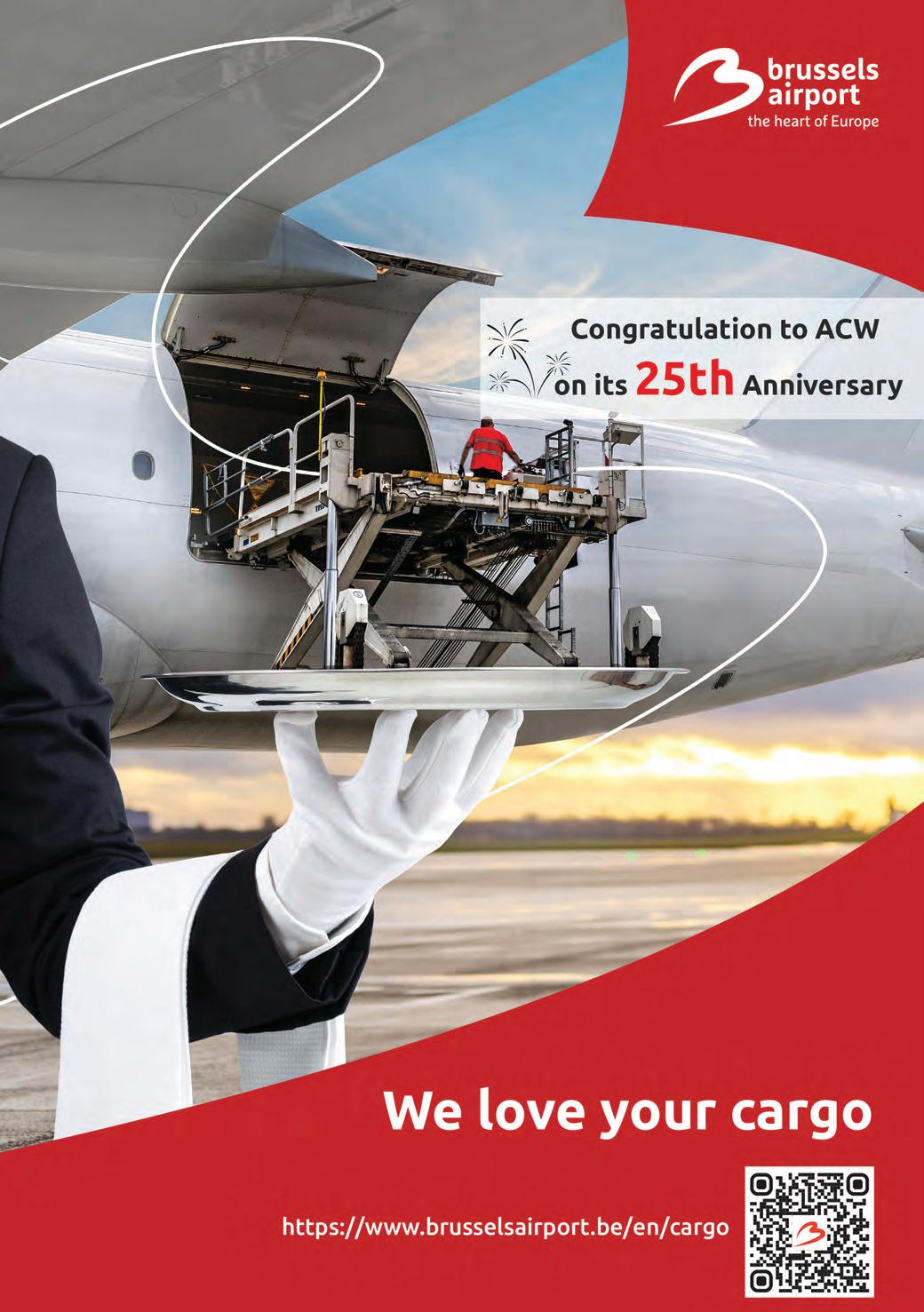
“Cargo now has a seat at the table”
No sooner had the first of the more than 75,000 visitors from over 120 countries streamed into transport logistic 2023, staged from 9 to 12 May after a four-year hiatus due to the pandemic, than many made their way to halls B1 and B2 to enjoy air cargo Europe. Four trade fair days, full halls, exhibitors and visitors from all over the world and a dynamic industry still on the rise – from May 9 to 12, 2023, transport logistic and the integrated air cargo Europe were once again the centre point of the air logistics industry.

Some 2,300 exhibitors from 67 countries at the event included many from the Middle East region. Among the group were some of the most important and well-known names in air cargo, air freight forwarding and ground handling.
The share of international visitors rose to over 50%, the highest ever and the number of visitors from the Middle East helped to boost this total.
Martin Drew, SVP global sales and cargo, Etihad Airways, said: “transport logistics and air cargo Europe delivered on their promise to be the largest scale events in this year’s air cargo calendar. It was a pleasure to spend time with our partners and customers, reconnecting in one place, strengthening existing partnerships and forging new relationships that will benefit not only our operations but the wider air cargo community.”
Among the Middle Eastern operators who were in Munich were Turkish Cargo, Emirates SkyCargo, Bahrain Airport, Celebi Cargo, dnata, Egyptianair Cargo, Etihad Cargo, Good Logistics, MNG Airline, Oman Air, Qatar Airways, Sharjah Airport, ULS Airlines Cargo and Saudia Cargo who was present on the Sky Team Cargo stand.
The Middle Eastern players travelled the hundreds of kilometres to Munich to set out stalls that closely reflected their confidence in the airfreight industry’s prospects in the near future. An industry insider from the region quipped that as there had been no physical trade shows since 2020 each operator had a substantial war-chest they could spend on their stands. Indeed, it was clear that certain players had spent tens of thousands of dollars on their stands.
Oman Air participated with a dedicated booth, where it showcased its innovative solutions and upcoming plans, including its first freighter that is expected during Q4 2023.
“The air cargo industry is experiencing a remarkable surge and Oman is well-positioned to capitalise on this trend with its strategic location and its focus on logistics as a cornerstone of economic diversification. Our efforts to transform Oman into a global logistics hub have yielded impressive results, and we continue to achieve record growth, a testament to our unwavering commitment to keeping pace with emerging technologies and meeting the ever-increasing demand for air cargo services,” said Jaffar Al Lawati, vice president –commercial cargo at Oman Air.
With total exhibition space of 127,000 sq m, the ten halls and the the outdoor area were completely booked out. Of the 2,320 exhibitors, 1,390 came from abroad—a record share of 60%. The top ten exhibitor countries after Germany included one from the Middle East. They were Netherlands, Italy, Belgium, France, Austria, China, Turkey, Spain, Poland and Great Britain.
Bahrain Airport Company (BAC), the operator and managing body of Bahrain International Airport (BIA), showcased the airport’s facilities and services at air cargo Europe 2023. The BAC’s delegation, led by chief development and technical officer Abdulla Janahi, highlighted BIA’s competitive advantages as a regional air cargo hub. These advantages include the offerings of the upcoming Cargo Express Village. Janahi said: “We are pleased with the outcome of our participation in air cargo Europe 2023 and are confident that the event will help us achieve our goal of building BIA’s reputation as a leading air cargo hub in the region. The launch of the new Cargo Express Village will increase Bahrain International Airport’s capacity to 1.6 million tonnes. Phase one of the project will be completed by the end of 2023, putting us in an even stronger position to forge new connections with key players and meet the evolving demands of the air cargo sector.” He added: “Designed to support Bahrain’s vision of becoming one of the world’s leading air cargo hubs by 2030, the facility will streamline cargo operations at BIA. With dedicated zones for specific types of operations, it will offer a wider range of facilities and services, making it easier and faster for companies to reach their customers across the region and beyond. The Cargo Express Village will also allow us to keep pace with rising local and regional demand for e-commerce and express cargo services.”


A
In order to activate the Customs Co-operation Agreement between the Kingdom of Saudi Arabia (KSA) and the Kingdom of Bahrain signed on December 30, 2019, Bahrain Airport Services (BAS) initiated the launch of a project to modernise the cargo cooling units for air cargo parcels and goods located on the western side of Bahrain International Airport as well as improving the custom interface facilities.
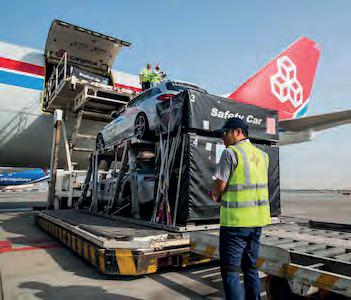
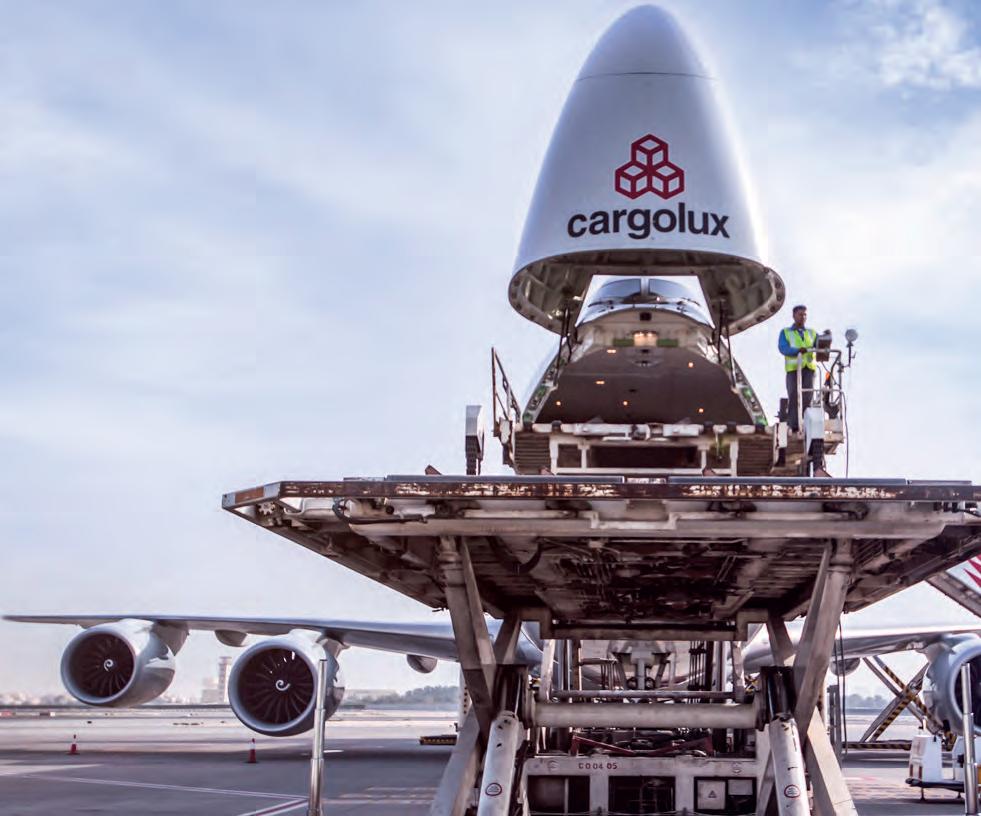
The agreement creates a single-entry point that enhances intra-regional trade through co-ordinated and sustainable custom procedures. BAS has completed the development of the Cargo Cooling Facility at the airport. BAS worked to enhance and expand the facilities of the refrigeration facility to meet all the storage requirements of goods imported via airfreight into Bahrain.
On the completion of the project, BAS chairman Nabeel Khalid Kanoo, said: “In compliance with the company’s fulfilment of the national plans related to the development of the logistics services sector, as well as the mutual agreement with the Kingdom of Saudi Arabia, the idea of modernising refrigeration units at Bahrain International Airport arose to ship cosmetics and later on pharmaceuticals to ensure their arrival with utmost quality due to the reliable storage unit/method.”
He added: “The aim of the newly developed facility is to facilitate the arrival of such goods imported from abroad to Bahrain International Airport, and then transporting them via land freight to the
Kingdom of Saudi Arabia without the need of re-inspection. BAS is aware of the positive impact this step will have on increasing incoming shipments to Bahrain and enhancing the movement of freight and international transportation of goods through Bahrain, as many airfreight companies prefer to land in the Kingdom to transport their goods to KSA. The company has already received several trucking orders for KSA from prominent freight service providers including CargoLux and Lufthansa, which has boosted ground transportation business at BAS. This service has been activated to ship cosmetics as a first step, with future directions to include pharmaceutical preparations as soon as possible to meet the pharmaceutical needs in Bahrain and the region.”
Mohamed Khalil Ahmed, CEO of BAS commented: “The updates that were made to the refrigeration units included the installation of a Building Management System (BMS) in order to automate the building and achieve higher efficiency of automatic control and monitoring of all equipment and devices to avoid any technical errors that may affect storage safety.”
He added: “The sizes of the cold rooms have also been expanded to double the storage capacity in the cargo cooling facility to meet the demand for storing pharmaceutical and cosmetic products. Furthermore, two additional cold rooms have been added with a total area of 415 sq m, which has led to the separation of the cold store into three sections, one of which is specialised in storing food items, one for medicines and pharmaceuticals and lastly cosmetics. The project also included modernising the approved storage freezers to operate
“The sizes of the cold rooms have also been expanded to double the storage capacity in the cargo cooling facility to meet the demand for storing pharmaceutical and cosmetic products”
at a controlled temperature of – 20, and adding two chillers to the previous chiller unit, which made the total area of the refrigeration units in the facility reach 222.7 sq m, with a cooling degree of up to 2 – 8 degrees Celsius.”
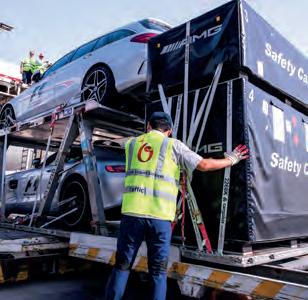

Through the development of BAS’ Cargo Cooling Facility, the ambition is to obtain CEIV (Center of Excellence for Independent Validators in Pharmaceutical Logistics) certification. This will “contribute to consolidating the Kingdom’s position on the map of logistics services and trade exchange, as a preferred destination for airfreight in the region,” said a statement.
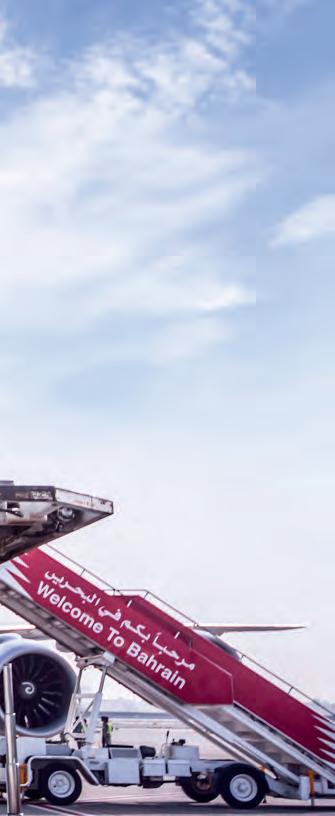
BAS has started the second phase of the Air Cargo Facility renovation with an effort to enhance the experience of customs visitors to the facility. In order to contribute to successful customs practices, BAS has collaborated with the Ministry of Interior, represented by Customs Affairs at Bahrain International Airport, to implement a project to revamp the customs clearance services centre.
The 500 sq m centre includes eight stands that provide customs clearance to visitors, in addition to administrative facilities and shared services for a number of relevant government entities such as the Ministry of Health and Ministry of Municipalities and Agriculture.
It will provide customs clearance services through the e-government portal and complete them at the centre. Among the most important of these services are the preparation of customs declarations for import and export, payment of customs duties and inspection and verification of goods.
Kanoo stated: “We conducted this project to establish a distinctive customer experience that represents the collaboration between BAS and Customs Affairs at Bahrain International Airport and to solidify the position to fulfill current demands and line with our future objectives. We did this out of our keen desire to realise the national objectives and plans for the growth of the logistics services industry.”
BAS aims to offer “top-notch products and services through this initiative” that support the implementation of efficient shipping and clearing procedures at the airport. Customs Affairs Colonel Rashid Al-Baker expressed his gratitude for the successful collaboration between Customs Affairs and Bahrain Airport Services BAS in revamping the customs clearance services centre. He also confirmed that the project to update the centre is in line with the goals of the “wise leadership to establish customs service centre in the Kingdom and the vision of the Ministry of the Interior to increase the operational effectiveness of customer service platforms by streamlining processes,” he said.
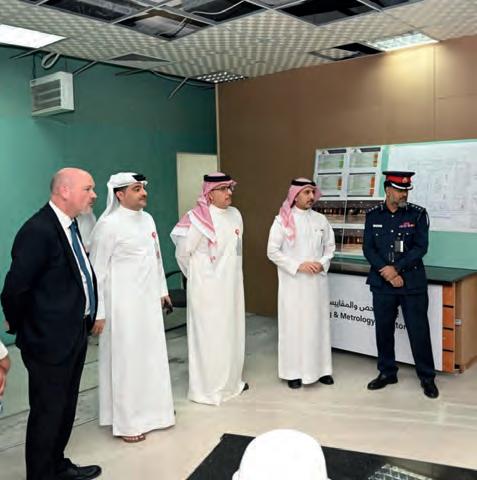
For UK-based HAE Group, the Middle East market may be thousands of kilometres from home but it remains “extremely important”, considers Andy Watson. regional director, UAE, Kenya and Egypt.

He says: “We have a very strategic, important footprint that we have invested in for many years. We have one of the largest presences for a global GSA company in the Middle East region and have built it over the past 15 years or so. It allows us to service and assist where required, both Middle East-based carriers but also our interline airline partners wishing to establish services in the region. Cross border trucking, local handling arrangements and all the aspects of carriers flying into the region, can avail of our assistance to ensure their services are successful.”
HAE Group inaugurated its presence in Dubai in 2007 to cater to the growing demands of its global clientele. Dubai, strategically located at the heart of Africa, the Middle East and Asia, proved to be an ideal hub for connecting the company’s expanding offices in the region. This move played a crucial role in the company’s regional development strategy.
For more than a decade, HAE Group has operated in Egypt on a sub-contracted basis, capitalising on the country’s well-established aviation sector. Egypt boasts a robust network of national and international airlines, facilitating regular flights to and from its airports. Recognising the need for a dedicated solution in Cairo, HAE Group took a significant step by establishing its own office in the capital city in 2021. This decision further solidified their commitment to serving clients from various parts of the world that rely on efficient logistics operations in Egypt.
HAE Group continuously strives to broaden its portfolio and maintain an extensive expertise in the Middle East/Gulf Cooperation Council (GCC) region, notes Watson. This entails not only comprehending the business landscapes prevalent in the area but also respecting and appreciating the diverse cultures within it. Such understanding enables HAE Group to customise its services to meet the specific requirements of clients hailing from the region.
“We have a unique ability to connect general cargo to value added
services and Middle East carriers like this approach,” says Watson, With a longstanding presence in the Middle East, HAE Group has forged many strong business relationships over the years. It has become an indispensable link connecting Asia, Africa, Europe and the USA. This integral role in facilitating trade and logistics across these continents has contributed to the company’s growth and reputation in the region. Currently the group represents Royal Jordanian, El Al and Egyptair.
In the face of global challenges witnessed over the past three years, the Middle East region, much like any other, displayed remarkable resilience. Though subjected to uncontrollable variables, the region endured alongside the rest of the world. However, what sets it apart is the swift rebound it experienced, surpassing many other parts of the globe. This rebound not only enabled HAE Group to sustain its commitment to serving customers but also allowed the group to proactively strategise for the revival of capacity in the region.
While it would be inaccurate to label it as existing in a bubble, the Middle East market exhibits the same ebbs and flows as any other. Nevertheless, it possesses a commendable strength and tenacity that contribute to its overall resilience. This market’s ability to endure and recover exemplifies its steadfastness and positions it as a robust and dynamic player in the global landscape.
Watson says: “The current market is super competitive. It always has been, but with the re-introduction of capacity across the region, it has been even more so. The one positive that we are seeing, whilst there is a lot of new or returning capacity, there is also slowly increasing demand. The Sea/Air business remains the primary service and we are seeing volume slowly increasing ex Asia via the Middle East, and in countries like Egypt, locally produced goods continue to support the additional capacity.”
Watson considers that transit airfreight plays a crucial role in the region, especially for countries like the UAE, Bahrain and Saudi Arabia. These nations serve as vital hubs for cargo movement, forming
“We have a unique ability to connect general cargo to value added services and Middle East carriers like this approach”
essential corridors for freight transportation from Asia to Europe, the USA and Africa. Many airlines operating in the region heavily rely on these corridors to facilitate airfreight operations.
The Middle East region, particularly the UAE, occupies a strategically advantageous position as an ideal transit point. Its central location is akin to being at the centre of the world, with approximately 7-hour flights connecting it to most parts of Asia and mainland Europe. This geographical advantage makes it the logical choice for establishing transit hubs and enables seamless airfreight connections across continents. The efficiency and convenience offered by the region’s transit airfreight services further solidify its importance in facilitating global trade and logistics.
The Middle East holds significance for HAE Group due to its involvement as a General Sales Agent (GSA) to Middle Eastern carriers, the establishment of an UAE office and other endeavours in the region. Overall, Middle East operations play a vital role in the success and growth of the group, acknowledges Watson.
The establishment of an UAE office further enhances its capabilities in the Middle East. The UAE serves as a strategic hub, connecting various regions such as Asia, Africa, Europe and the USA. By maintaining a physical presence in the UAE, HAE Group can better cater to the unique needs of clients, offer localised services, and strengthen our relationships with key stakeholders.
Watson says: “We have a very strategic, important footprint that we have invested in for many years.”
In the coming decades, the evolution of airfreight is expected to be heavily influenced by digitalsation. While the passenger side of the airline industry has made significant technological advancements, the cargo sector is now experiencing a phase of growth and innovation. HAE Group, for instance, has been proactive in developing its own systems and leveraging API (Application Programming Interface) connections to seamlessly integrate with various airline systems.
Digitalsation brings forth increased operational and commercial efficiency. By automating numerous processes, airfreight companies can streamline their operations, freeing up valuable time and resources to focus on developing new business opportunities. This, in turn, leads to enhanced revenue generation for carrier partners and fosters mutually beneficial relationships. Moreover, digitalsation enables the implementation of advanced tracking and monitoring systems, improving transparency and visibility throughout the supply chain. Real-time data exchange and analytics provide valuable insights that optimize routes, inventory management, and overall logistics operations. Additionally, digital platforms facilitate seamless collaboration and information sharing among stakeholders, resulting in improved communication and co-ordination.

In regards to expanding the HAE Aircraft & Cargo Handling services to the Middle East, Watson has considered the possibility of replicating its unique handling solutions in the region. However, it is important to note that the Middle East market presents certain challenges. Typically, there is only one handling agent per country, and in some cases, there might be two. Breaking into this market can be quite difficult.
If HAE Group were to pursue expansion in the Middle East, it would approach it by focusing on specific groups of clients or products that align with the Group’s expertise. For instance, handling operations in the UK and Northern Ireland are centred around e-commerce and integrators. Similarly, in the Middle East, it would identify a niche or target client segment where its services can provide significant value.
One project that showcases HAE Group efforts in the Middle East is in Abu Dhabi. It is collaborating with a strong local partner to bring its expertise to the region and deliver exceptional handling solutions, notes Watson.
By working alongside trusted partners, it can navigate the intricacies of the Middle Eastern market and effectively tailor services to meet the specific needs and demands of clients.
“We have a very strategic, important footprint that we have invested in for many years”